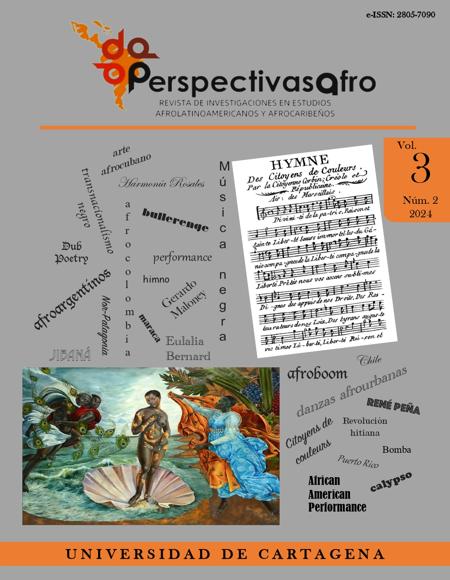La expresión visual como práctica feminista decolonial en las pinturas de la artista afrocubana Harmonía Rosales
Visual Expression as a Decolonial Feminist Practice in the Paintings of Afro-Cuban Artist Harmonia Rosales
Contenido principal del artículo
Resumen
Este ensayo profundiza en las técnicas, inspiraciones y simbología que rodean la obra de arte de Harmonia Rosales, una artista afrocubana conocida por su recreación de pinturas clásicas que representan a mujeres negras asumiendo roles de poder. A través de un análisis feminista decolonial de tres de sus pinturas, este ensayo intenta responder las siguientes preguntas de investigación: ¿de qué manera las expresiones de arte visual de Harmonía Rosales son herramientas efectivas para defender la justicia social? ¿Podemos concebir su arte visual como parte del legado del activismo afrodescendiente y las prácticas feministas decoloniales?.
Descargas
Datos de publicación
Perfil evaluadores/as N/D
Declaraciones de autoría
Indexado en
- Sociedad académica
- Universidad de Cartagena
- Editorial
- Universidad de Cartagena
Detalles del artículo
Referencias (VER)
Aldahan A, et al. “Discrimination against People with Dermatologic Diseases”. JAMA Dermatology 152/2 (2016): 140–140. DOI: https://doi.org/10.1001/jamadermatol.2015.3886
Anzaldúa, Gloria. Borderlands/La frontera: The New Mestiza. San Francisco: Aunt Lute Press, 1987.
Baba, Ifa Karade. The Handbook of Yoruba Religious Concepts. Newburyport, Massachusetts: Weiser Books; 2020.
Binford, Sally. “Myths and Matriarchies”. En The Politics of Women's Spirituality: Essays on the Rise of Spiritual Power within the Feminist Movement. C. Spretnak, ed. New York: Doubleday, 1982. 541-549.
Capone, Stefania. “The Orisha Religion in a Transnational Perspective”. Social Compass 69/2 (2022): 135-152. DOI: https://doi.org/10.1177/00377686221083515
Cleveland, Christena. God is a Black Woman. San Francisco: HarperOne, 2022.
Chwalkowski, Farrin. Symbols in Arts, Religion and Culture: The Soul of Nature. Newcastle upon Tyne, United Kingdom: Cambridge Scholars Publishing, 2016.
Curiel, Ochy. “Identidades esencialistas o construcción de identidades políticas: El dilema de las feministas afrodescendientes”. Otras Miradas 2/2 (2005): 96-113.
___. “Crítica poscolonial desde las practices del feminism antirracista”. Nómadas 26/1 (2007): 92-101.
___. "Hacia la construcción de un feminismo descolonizado. A propósito de la realización del Encuentro Feminista Autónomo: Haciendo Comunidad en la Casa de las Diferencias". En Emancipaciones feministas del siglo XXI. Martínez Alonso, Gleidyz and Martínez Toledo, Yanet, eds. Panamá: Ruth Casa Editorial, 2010. 189-200.
Dache, Amalia, et al. “A Calle Decolonial Hack: Afro-Latin Theorizing of Philadelphia's Spaces of Learning and Resistance”. Teaching in Higher Education 26/7-8 (2021): 1077-1097. DOI: https://doi.org/10.1080/13562517.2021.1940927
Daly, Mary. Beyond God the Father: Toward a Philosophy of Women's Liberation. 2nd edition. Boston: Beacon Press, 1985.
De la Fuente, Alejandro. “Afro-Latin American Art”. En Afro-Latin American Studies: An Introduction. de la Fuente, Alejandro and George- Reid Andrews, eds. Cambridge: Cambridge University Press, 2018. 348-405. DOI: https://doi.org/10.1017/9781316822883.010
Denmark, F. L. “Prejudice and Discrimination”. The Corsini Encyclopedia of Psychology (Vol. 4). I. B.Weiner & W. E.Craighead (Eds.), Hoboken, New Jersey: Wiley, 2010. DOI: https://doi.org/10.1002/9780470479216.corpsy0700
Do Bú, E. A., Alexandre, M. E. S., Scardua, A., & Araújo, C. R. F. "Vitiligo as a Psychosocial Disease: Apprehensions of Patients Imprinted by the White". Interface: Comunicacao, Saude, Educacao 22/65 (2018): 481–491. DOI: https://doi.org/10.1590/1807-57622016.0925
Falu, N. “Arts of Being Yorùbá: Divination, Allegory, Tragedy, Proverb, Panegyric”. Magic, Ritual & Witchcraft 14/3 (2019): 472-474. DOI: https://doi.org/10.1353/mrw.2019.0041
Facio, Elisa and Irene Lara (Eds.). Fleshing the Spirit: Spirituality and Activism in Chicana, Latina, and Indigenous Women’s Lives. Tucson, Arizona: University of Arizona Press, 2014.
Figueroa, Yomaira. “After the Hurricane: Afro-Latina Decolonial Feminisms and Destierro”. Hypatia, 35/1 (2020): 220-229. DOI: https://doi.org/10.1017/hyp.2019.12
Firooz, A., et al. “What Patients with Vitiligo Believe about their Condition". International Journal of Dermatology 43/11 (2004): 811–814. DOI: https://doi.org/10.1111/j.1365-4632.2004.02059.x
Fusco, Coco. The Bodies That Were Not Ours: And Other Writings. London, United Kingdom: Routledge, 2001.
Garcés Marrero R. “Olokun en África y en Cuba: Cosmología afrocubana y tradición oral”. The Polish Journal of Arts and Culture 15/1 (2022): 85-102. DOI: https://doi.org/10.4467/24506249PJ.22.004.16026
"Harmonia Rosales repaints classic artworks to show God is a black woman". Dazed. 2018. https://www.dazeddigital.com/art-photography/article/41202/1/harmonia-rosales-repaints-classic-artworks-god-is-a-black-woman-rjd-gallery
Hartman, Saidiya V. Lose Your Mother. A Journey Along the Atlantic Slave Route. London, United Kingdom: Macmillan Publishers, 2008.
Hull, Alasha Gloria. Soul Talk: The New Spirituality of African American Women. Inner Traditions, 2001.
Idang, Gabriel. “African culture and values”. Phronimon 16/2 (2015) 97-111. DOI: https://doi.org/10.25159/2413-3086/3820
Jiménez Román, Miriam. “Allá y Acá: Locating Puerto Ricans in the Diaspora(s)”. Diálogo 5/1 (2001): 10-13.
___. “Looking at that Middle Ground: Racial Mixing as Panacea?”. A Companion to Latina/o Studies. Juan Flores and Renato Rosaldo, eds. Hoboken, Nueva Jersey: Blackwell Publishing Ltd, 2007. 325-336.
Jorge, Angela. “The Black Puerto Rican Woman in Contemporary American Society”. En The Afro-Latin@ Reader. Miriam Jiménez Román and Juan Flores, eds. Durham: Duke University Press, 2010. 269-275. DOI: https://doi.org/10.1215/9780822391319-040
López Oro, José. “Ni de aquí, ni de allá: Garífuna Subjectivities and the Politics of Diasporic Belonging”. En Afro-Latin@s in Movement: Critical Approaches to Blackness and Transnationalism in the Americas. Petra R. Rivera-Rideau, Jennifer A. Jones, and Tianna S. Paschel, eds. Palgrave Macmillan, 2016. DOI: https://doi.org/10.1057/978-1-137-59874-5_3
Lugones, María. “Toward a Decolonial Feminism”. Hypatia 25/4 (2010): 742-759. DOI: https://doi.org/10.1111/j.1527-2001.2010.01137.x
Méndez, María José. “‘The River Told Me’: Rethinking Intersectionality from the World of Berta Cáceres”. Capitalism Nature Socialism 29/ 1 (2018): 7-24. DOI: https://doi.org/10.1080/10455752.2017.1421981
Moraga, Cherrié and Gloria Anzaldúa. This Bridge Called My Back: Writing by Radical Women of Color. Women of Color Press, 1981.
Morales-Sánchez, M. A., et al. “Impact of Vitiligo on Quality of Life”. ACTAS Dermo-Sifiliográficas 108/7 (2017): 637–642. DOI: https://doi.org/10.1016/j.adengl.2017.06.001
Olademo O. Women in Yoruba Religions. New York: New York University Press, 2022.
Omosule, Segun. “Redefining Oral African Literature”. KIU Journal of Humanities 4/4 (2020): 173-182.
Ortner, S.B. “Is Female to Male as Nature is to Culture?” Women, Culture and Society. M. Rosaldo and L. Lamphere, eds. California: Stanford University Press, 1974.
Penagos E. “Teaching Religious Traditions through Place: A Case for Place-Based Associative Pedagogy in Orisha Traditions”. Practical Matters 12/1 (2019): 121-131.
Prieto, René. Body of Writing: Figuring Desire in Spanish American Literature. Durham: Duke University Press, 2000. DOI: https://doi.org/10.1515/9780822380726
Rivero, Eliana. “Fronterisleña, Border Islander”. Michigan Quarterly Review 33/ 4 (1994): 669-674.
Ruiz, Ada. “Harmonia Rosales: Black Femininity in Classical Artworks”. Los Angeles Academy of Figurative Art, 2018. https://laafa.edu/harmonia-rosales-black-femininity-in-classical-artworks/
Scerbo, Rosita. “Bridging the Gap Between Literature and Visual Art: Reimagining Black Femininity Through an Ekphrastic Analysis of Harmonia Rosales' Decolonial Feminist Aesthetics”. Hispanic Journal 44/2 (2023): 125-147.
___. The Afrodescendant Woman in Latin American Diasporic Visual Art. Routledge: series Routledge Research in Art and Race, 2024.
Scerbo, Rosita and Concetta Bondi. “Centering Black Women/Challenging Latinidad and Hegemonic Discourses”. En AfroLatinas and LatiNegras: Culture, Identity, and Struggle from an Intersectional Perspective. Rosita. Scerbo & Concetta Bondi, eds. Rowman & Littlefield, Lexington Books, series Critical Africana Studies, 2022. 1-28. DOI: https://doi.org/10.5771/9781666910346-1
Souza, Caridad and Karina Céspedes. “Dispatches from an Afro-Latinx Decolonial Feminism”. Chicana/Latina Studies: The Journal of Mujeres Activas en Letras y Cambio Social 22/1 (2022): 26-65.
Spretnak, C. (Ed.) The Politics of Women's Spirituality: Essays on the Rise of Spiritual Power within the Feminist Movement. New York: Doubleday, 1982.
Stewart DM. “African Archives in the Caribbean: The Yoruba Tradition, Cultural Experts, and the Unmaking of Religious Knowledge in Twentieth-Century Trinidad”. History & Anthropology 34/5 (2023): 779-800. DOI: https://doi.org/10.1080/02757206.2023.2249485
Valdés, Vanessa. Oshun’s Daughters: The Search for Womanhood in the Americas. New York: SUNY Press, 2014. DOI: https://doi.org/10.1353/book28073
Zamora, Omaris. “(Trance)forming AfroLatina Embodied Knowledges in Nelly Rosario’s Song of the Water Saints”. Label Me Latina/o Special Issue: Afro-Latina/o Literature and Performance 7/1 (2017): 1-16.



 PDF
PDF
 FLIP
FLIP
 HTML
HTML






